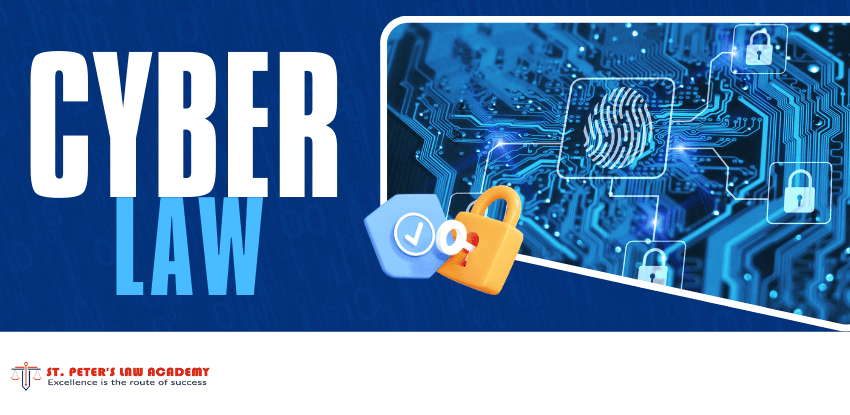+91 9990898327
Office : 632, Dr. Mukherjee Nagar, Delhi 110009
Mon-Sun: 09:00AM - 08:00PM

Cyber law refers to the legal concerns surrounding the use of communications technology, namely cyberspace or the Internet. It includes many legal topics, such as intellectual property, privacy, freedom of expression, and jurisdiction, making it less of a distinct field of law than property or contract law.
Cyberlaw safeguards people and businesses from online risks, guarantees online transactions' confidentiality and security, and defines standards for moral and appropriate behaviour in cyberspace. The significance of cyber law is growing as the digital world develops, acting as a foundation for the ethical and legal use of digital resources.
In India, Cyber Crime has increased with time, with e-business, e-commerce, e-governance, and e-procurement, among other things. Cyber laws address all legal difficulties, including internet crime. As the number of internet users grows, so does the importance of cyber laws and their implementation.
Cyber law is the law that deals with the Internet's relationship to technological and electronic elements, including computers, software, hardware, and information systems.
Cyberlaw covers an extensive range of issues, including online communication, e-commerce, digital privacy, and the prevention and prosecution of cybercrime.
With the advancement of computer and internet technology, cyber crimes have exponentially evolved and affected not only businesses but also people at a personal level globally due to crimes in cyberspace.
The Information Technology Act of 2000 is an Act of the Indian Parliament which was implemented on October 17 2000. It is India’s primary law dealing with cybercrime and electronic commerce.
The law provides the legal framework for electronic governance, recognising electronic records and digital signatures.
Section 66A was introduced to address cybercrimes arising from the emergence of technology and the Internet.
The Digital Personal Data Protection (DPDP) Act, 2023 was passed in the Indian Parliament in early August 2023. The bill is expected to protect the privacy of individuals and provide them more control over their personal data.
Cybercrime is a term used to describe a wide range of criminal activities involving the use of networks and digital devices.
If anyone intentionally engages in fraud, the punishment, as per the IT Act 2000, includes a fine of Rs. 5 lakh, imprisonment for a period of 3 years, or both.
The following is the legal framework for online transactions:-
• IT Act, 2000: The Information Technology Act, 2000 is an Act of the Indian Parliament implemented on October 17 2000. It is India’s primary law dealing with cybercrime and electronic commerce.
• Consumer Protection Act, 2019: The Consumer Protection Act 2019 was presented to the Lok Sabha on July 8 2019, to replace COPRA, 1986.
In today's tech world, consumer protection in the digital market is crucial. The rise in online shopping and digital transactions has made it more important than ever to ensure that customers are protected from fraud, false advertising, and unfair practices
A team of information security specialists, the Computer Emergency Response Team (CERT), is responsible for guarding against, identifying, and handling cybersecurity problems within an organisation. The team may concentrate on handling incidents of data breaches in addition to sending out notifications and incident handling protocols.
The Indian government established Cyber Crime Cells and Cyber police to shield people from many cyber crimes in cyberspace. Its primary purpose is to safeguard devices and services from attacks by hackers, spammers and cybercriminals.
Due to the evolving technology landscape, the IT Act was amended over time to become an IT amendment act. As a result, the definition of cybercrimes expanded, and acts involving fraud, data breaches, and online abuse were given legal san
Several notable cyber law cases in India have shaped the legal landscape and interpretation of cyber laws. Here are some critical cases:
1)Shreya Singhal v. Union of India (2015)
Key Issue: Constitutionality of Section 66A of the IT Act.
2) K.S. Puttaswamy v. Union of India (2017)
Key Issue: The right to privacy is a fundamental right.
1)Shreya Singhal v. Union of India (2015)
The Supreme Court struck down Section 66A, which criminalized offensive messages through communication services, because it violated the right to freedom of speech and expression under Article 19(1)(a) of the Constitution.
2) K.S. Puttaswamy v. Union of India (2017)
The right to privacy was declared a fundamental right under Article 21 of the Constitution by the Supreme Court.
The following are the emerging threats and challenges in cyber law:-
1)Biometric data:
With facial recognition and different biometric data by AI, there can be misuse or unauthorised surveillance.
2)Data Protection:
AI requires vast amounts of data, which can raise concerns about data privacy and protection.
3)Transparency:
It has become difficult to understand and challenge AI-driven decisions due to the lack of transparency in AI decision-making processes.
Following is the need for continuous legal evolution:-
1. Regular updates: Flexible legal frameworks that can be quickly adapted must be developed to keep pace with technological advancements.
2. Public awareness: Through public awareness, citizens can learn about cyber laws, their rights, and their responsibilities in the digital space.
3. Transparency: In the development and implementation of cyber laws.
Citizens can protect themselves and responsibly navigate the digital landscape through public awareness and digital literacy in cyber laws.
The digital world is continuously evolving, making cyber law even more important. Cyber law protects the rights and security of individuals, organizations and nations. They lay down the framework for ethical utilization of digital resources. The IT Act has been crucial in addressing the challenges of cyber threats and promises a safe digital environment in India.
The Information Technology Act of 2000 is an Act of the Indian Parliament which was implemented on October 17 2000. It is India’s primary law dealing with cybercrime and electronic commerce.
Cyber law provides a structure for protecting personal data from cyber threats. It lays the guidelines for ethical conduct in cyberspace.
You can take legal action against online fraud by approaching any cybercrime cell.
Post a comment